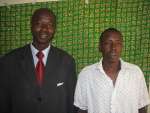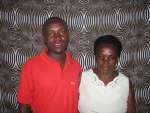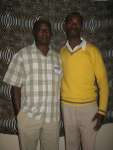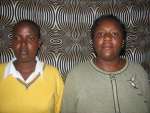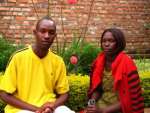Zimulinda Pheneas & Shingiro Remy
Full of questions concerning the history of religion in Rwanda and how Rwandan culture of the past differs from that of today, Shingiro Remy listens intently to the words of Zimulinda Pheneas, his counselor. Zimulinda Pheneas discusses the origins of churches in Rwanda, the issues of teen pregnancy and drug abuse, how children were traumatized even without going through the genocide, the effect of good parenting and community parenting, and his philosophy on education. He goes into detail on such subjects as rape, gendered violence, and prostitution.
Sebakaka Deó & Muvumyi Olivier
Looking for guidance on his career and life path, Muvumyi Olivier speaks with his uncle, Sebakaka Deó. His Uncle explains what success meant for his life and how he achieved it both for his career and family. As his uncle shares his stories, Muvumyi Olivier discovers that Sebakaka Deó suffered tremendously on his journey to become the man that he is today. Sebakaka Deó recalls a time of immense heartache as well as strength when “I lost my wife after our wedding. It was such a terrible moment that required me to stand strong, pray hard, and become more patient!”
Nsabimana Jean Pierre & Zaninka Scola
Zaninka Scola was born shortly after her father’s death and only got to know her mother for a short time before she died. In this story, her elder brother Nsabimana Jean Pierre shares with her all that she wants to know about their parents: their marriage, their values, their care for them as children. His message to her is partly summed up in a Rwandese proverb that means, ‘no one shall receive what they have not earned.’ He also passes to her the legacy given to him by their father that they must always share what they have with others.
Uwamariya Victoire & Kabuto Noah
Kabuto Noah is curious about the trauma he witnesses in children who are not old enough to remember or have experienced the genocide, but have been affected by it nonetheless. Uwamariya Victoire tells him about the ways the genocide changed how lives are experienced, complicating everything from family structure to education. Most importantly, Kabuto Noah and Uwamariya Victoire discuss the ways that fear, anger, and sadness are best handled.
Mukankubana Rose & Kwizera Jean Pierre
Mukankubana Rose tells her son about finding strength as an orphan, as a widow, and as a mother, and the secret to raising children in difficult times. Kwizera Jean Pierre is curious about the influence of their older family members, the hardest decision she had to make between education and the love she had for her family, and a book written by his uncle.
Habumukiza Bernard & Mujyanama Eric
Habumukiza Bernard talks to his student, Mujyanama Eric, about the importance of education and his decision to become a teacher, reminding him that the most important aspect of employment isn't always how much money you make.
"When you are at school you have to be united, to know that you are all students from the same
school, you are all Rwandans; you are all young and consider yourself as twins who have the
same mother." Habumukiza Bernard
"What is the secret of doing the same job for a long time?" Mujyanama Eric
Twahirwa Deborah & Tuyishimire Florence
When a large number of children were orphaned by the genocide, it became difficult for many of them to find people to replace their families and get advice from. Twahirwa Deborah tells Tuyishimire Florence the ways orphans can see love and comfort in the world so they can hope for a brighter future, and how all Rwandans must forget about their differences and become one family.
Ndiseguye Aloysia & Gatesi Charlotte
Ndiseguye Aloysia helps Gatesi Charlotte understand how to lead a productive and fulfilling life and reminds her to always ask for advice from older people. Ndiseguye Aloysia reminds her that children should be helped and treated with empathy rather than punished, and that being studious is the best way to avoid trouble. Importantly, boys and girls should respect each other and study together to encourage one another.
"To learn how to listen, to respect and to ask for advises, it is very good. If you are advised...you should feel that you are lucky." Ndiseguye Aloysia
Umamwezi Philomene & Masengesho Rosine
Both Masengesho Rosine and her grandmother have experienced the hardships that women faced, the genocide, and life as orphans. But have never before spoken to one another about their lives. Umamwezi Philomene acknowledges the hurt and suffering women in particular have struggled with in Rwandan history, but sees a bright future for Masengesho Rosine through her youth and educational opportunities. Most importantly, she reminds her that all Rwandans should stand together for justice and peace, and being an orphan does not mean you cannot find a parent to advise you in times of need.
Umazikungu Beatrice & Gashumba Yves Fabrice
Although Gashumba Yves Fabrice and longs for a peaceful future, he still has a hard time forgiving those involved in the genocide and fears the resurgence of conflict. His friend Umazikungu Beatrice reminds him that kindness toward everyone is the best way to prove that Rwanda can move forward, and it is better to be remembered for acts of kindness rather than the brief satisfaction of taking revenge and being remembered for evil.



